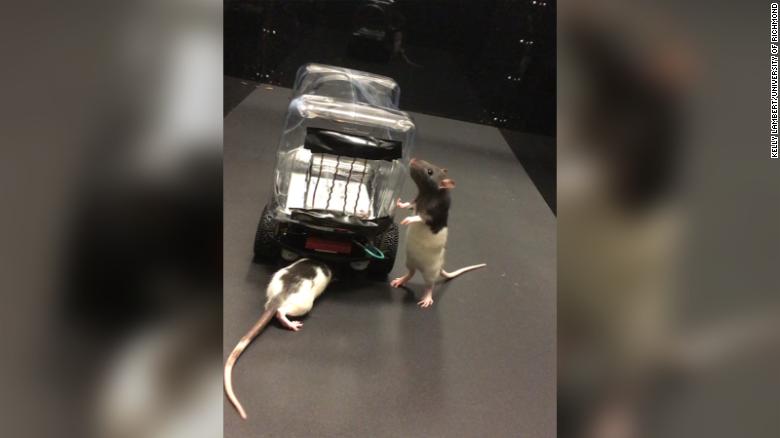- Click to share on Facebook (Opens in a new window)
- Click to share on Twitter (Opens in a new window)
- Click here to share on LinkedIn (Opens in a new window)
- Click to email a friend (Opens in a new window)
(CNN) - Rats have learned to drive and drive their own small cars in exchange for Froot Loops.
That is a feat alone.
But the true discovery in the research, and its broader implications for the treatment of human mental health, was found in their feces, according to new findings published in Behavioral Brain Research.
Scientists taught some rats to drive small cars. This could help humans https://t.co/235ew00oC4 pic.twitter.com/ybj1jtsZr3
- CNN in Spanish (@CNNEE) October 23, 2019
Rats are better drivers when they are mentally stimulated
Kelly Lambert, author of the study and director of the Lambert Behavioral Neuroscience Laboratory at the University of Richmond, trained two groups of young rats: a group raised in an “enriched environment” with toys, stairs, balls and pieces of wood designed to Stimulate mental stimulation, and another raised in a standard and little stimulating laboratory cage.
Rats learned to enter a "rat-operated vehicle" or ROV , adorably constructed from a gallon-sided plastic dump container.
Once inside, the rats and their cars were positioned on an aluminum plate and pressed a copper bar that drives the wheel motor. They keep the bar pressed until they propel their small car until the end of their enclosure, where they collect their reward: Froot Loops.
At the time of driving, the rats that played with stairs, balls and toys were more skilled at operating and directing the ROV, thanks to the neuroplasticity (the ability of their brains to change over time) triggered by their surroundings. His cage counterparts not effectively stimulated "failed his driving test," Lambert said.
The hormones found in their stool showed a better emotional recovery capacity
When examining his stool, Lambert found in both groups of rats trained to drive higher levels of corticosterone and DHEA secreted, hormones that control stress responses.
Corticosterone is a hormone that animals can secrete in high-risk scenarios such as running away from a wild animal or defending themselves from predators, but it can also be expressed in lower-risk tasks such as calculating taxes or worrying about a loved one (although rats they are probably not advanced enough to form a government, let alone impose taxes on fellow rats).
DHEA acts as a kind of “buffer,” said Lambert, when corticosterone becomes toxic, that is, when it cannot be turned off in a reasonable period of time, creating prolonged stress.
It is evidence that mastering a complex task, such as driving a car, reinforced the emotional resistance of rats.
"Driving is likely to give rats a sense of control over their surroundings," he said. "In humans, we would say it improves the sense of agency or self-efficacy."
What do rats have to do with human health?
The brains of humans and rats share almost all of the same areas and neurochemicals: they are smaller in rodents. And although humans are certainly more complex than rats, Lambert said there are "universal truths" in how the brains of both species interact within their environment to maintain optimal mental health.
Therefore, these results also have implications for human health (and no, they do not mean that rats will drive alongside people in small lanes on the roads). Emotional resilience is one of the first lines of defense against mental illnesses such as depression, he said, and learning what behaviors accumulate could give doctors clues about how to treat those diseases in humans.
It is a concept that Lambert refers to as "behavioral products," activities that release hormones that can prevent prolonged stress caused by corticosterone.
"Anything that reduces stress can develop resistance against the onset of mental illness," he said.
The activity can be something as simple as knitting or, in the case of rats, learning to drive a car. Only involving hands, legs and brains of different sizes can improve a participant's sense of control.
Rats Mental Health


/cloudfront-eu-central-1.images.arcpublishing.com/prisa/2I75T5NCTFFJTDKNAD4SDRCYKM.jpg)











